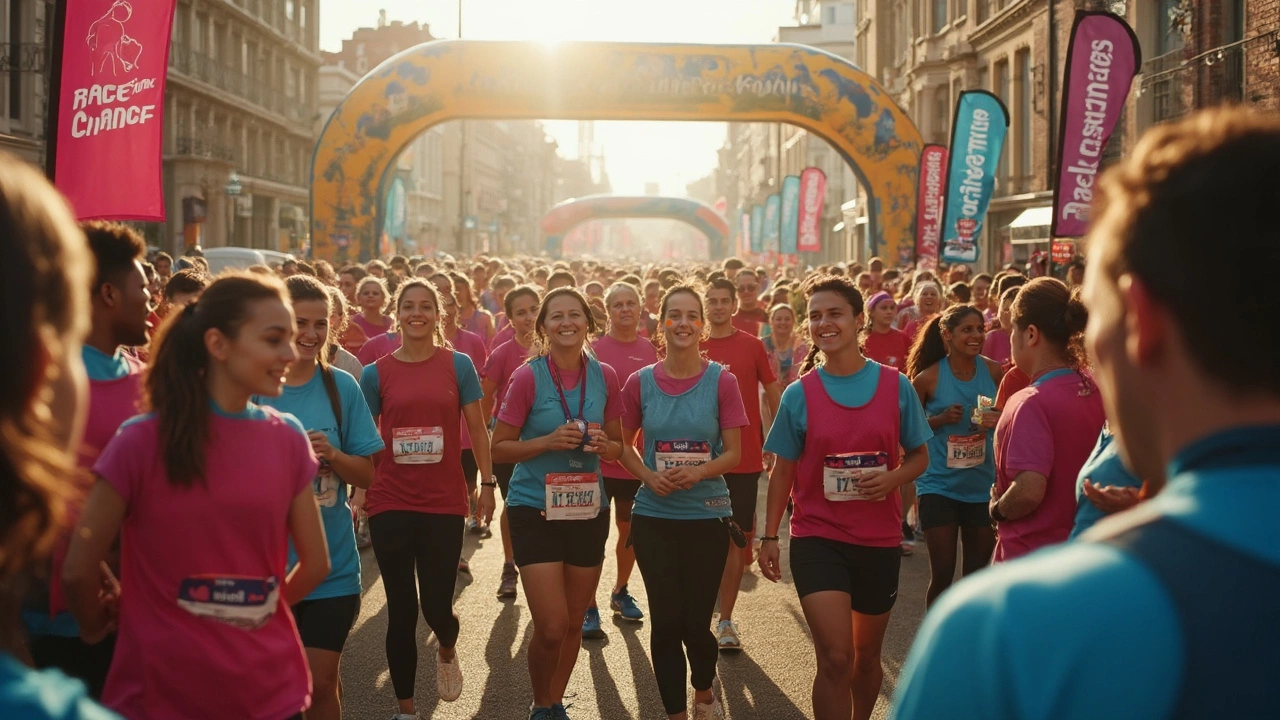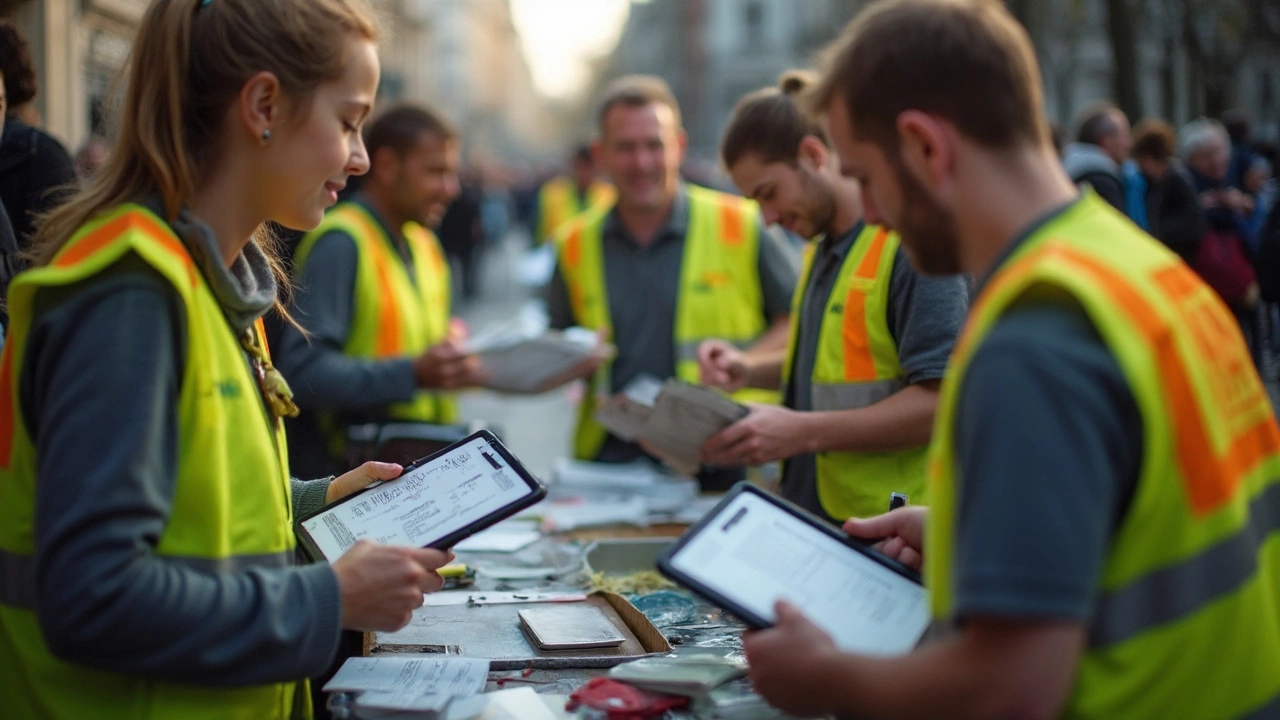What Race Pays the Most? Navigating the Most Rewarded Volunteer Opportunities
 Apr, 19 2025
Apr, 19 2025
Ever signed up for a 5K or marathon hoping for more than just a free T-shirt? Here’s the thing: not all volunteer races pay—and in most cases, giving back comes with zero cash. But if you’re on the hunt for volunteer race gigs that reward you beyond good vibes, you’ll need to know where to look and what to expect.
First off, let’s clear up a common mix-up. Most charity races and fun runs don’t actually pay volunteers. In fact, the majority offer snacks, merchandise, or maybe an entry to a future race as a thank-you. Still, some bigger events—think national marathons, obstacle races, or corporate-sponsored charity runs—do pay volunteers for their time or special skills. These payouts aren’t usually bountiful, but for a day’s work, the rates can be surprisingly decent.
- Paid Volunteer Races Versus True Volunteering
- Which Race Events Offer the Biggest Payouts?
- Behind the Numbers: Why Do Some Races Pay More?
- How to Land a High-Paying Volunteer Race
- Smart Tips for Maximizing Your Take-Home
Paid Volunteer Races Versus True Volunteering
People toss around the word “volunteer” like it always means free labor. But when it comes to volunteer races, that’s not always the story. There’s a real difference between lending a hand for zero pay just to help out—and signing up for one of those so-called "volunteer" gigs that actually put some money in your pocket.
In traditional charity races, like your neighborhood 5K or big causes like Relay for Life, the experience is all about giving your time. You might get a T-shirt, maybe a meal, or a medal. The real perk is knowing you’re supporting a cause. These are what most people picture when they hear "volunteer," and the vibe is usually super positive and community-driven—but don’t expect a paycheck.
Now, switch over to paid spots. National events like the New York City Marathon or large corporate-sponsored fun runs sometimes offer cash or gift cards to volunteers, especially for jobs that need technical skills, like race timing, first aid, managing logistics, or leading big groups. These positions are usually snatched up fast, since folks know there’s real money on the table—not just swag.
And here’s a little reality check: paid “volunteer” jobs at these events are more like short-term contract work. They blur the line between volunteering and temporary employment. The word “volunteer” sticks mostly because the event’s about fundraising and charity, but you’re getting paid for your effort.
Check out this quick table comparing what you get from each type:
| Type | Typical Compensation | Example Event |
|---|---|---|
| True Volunteering | Swag, food, community service credit | Local 5K for charity |
| Paid Volunteer Race | Cash, gift cards, higher-value swag | Major city marathon, Ironman, sponsored obstacle runs |
So, if your goal is to make some money while helping out, focus your search on larger, ticketed paid volunteer opportunities. But if you’re after a feel-good day and some community spirit, you’ll find plenty of true volunteer races and walks happy to have you on the team—even if the only "pay" is a smile and a thank-you.
Which Race Events Offer the Biggest Payouts?
If you're after the races that offer the most cash for volunteers, some trends stand out. The races with the biggest budgets—usually massive marathons, major obstacle courses, and corporate-sponsored charity runs—are where the payouts really happen. Paid volunteer opportunities are most common at these types of events because they need lots of help and want to keep experienced people coming back.
Let’s get specific. Big city marathons like the New York City Marathon and Chicago Marathon pay race-day volunteers for roles like course marshals, registration helpers, and setup crews. The rates vary, but you’ll often see payments of $15–$20 per hour, especially for tough shifts like early mornings or bad weather picks. Some large obstacle races, like Spartan Race or Tough Mudder, also pay volunteers, usually for tasks like gear check, safety monitoring, and hydration support. Those jobs can pay in the $100–$200 range for a full event day, sometimes with extra perks like race entries or gear credits.
Charity events run by big sponsors—think Susan G. Komen Race for the Cure or large Color Run events—sometimes surprise volunteers with Amazon gift cards or event credits. It’s not always cash in hand, but it can add up fast, especially if you string together a bunch of events during race season.
If you’re wondering where the most volunteer races with pay pop up, here’s a snapshot of what you could expect at different races:
| Event | Typical Volunteer Pay | Extras |
|---|---|---|
| New York City Marathon | $15–$20/hr | Free gear, meals |
| Spartan/Tough Mudder | $100–$200/event | Race entry, swag |
| Color Run (major city) | Gift cards | Merch bundle |
| Corporate 5Ks | $50–$100/event | Lunch, networking |
Smaller community 5Ks, fundraising walks, or local bike rides almost never pay volunteers, since those usually run on tight budgets and rely heavily on good old volunteer spirit. If you want that sweet spot of helping out and getting paid, focus on fundraising events and big-name charity races in larger cities. The bigger the sponsor, the higher your odds of landing a paid spot as a volunteer.

Behind the Numbers: Why Do Some Races Pay More?
It’s not all about charity or fun—when a volunteer race pays actual money, there’s usually a reason. Some events just have bigger budgets. Big city marathons and national obstacle races rake in serious cash through sponsorships and thousands of registrations, so they can afford to offer payment. For example, the New York City Marathon has paid hundreds of volunteers each year for roles that need real commitment, like course setup and first-aid support.
Timing also matters. Races happening in the heat of summer or very early mornings have to offer more cash or better perks to get people to show up. No one really loves waking up at 4 a.m. to direct parking unless there’s a strong incentive, right?
But here’s the real kicker: skill and responsibility play a huge part. Jobs that involve medical care, timing operations, or logistics are the ones that come with higher pay. So, if you’ve got a CPR card or tech skills, you’re way more likely to land a paid gig at a volunteer race or fundraising event.
Here’s how it usually breaks down when it comes to why some races pay more than others:
- High attendance—More people means more money, so races like Color Run or Tough Mudder offer paid roles.
- Corporate sponsorships—Big brands mean bigger budgets for paying volunteer opportunities.
- Specialized needs—Medical, tech, or security roles bump the pay up, sometimes to $15–$25 per hour.
- Shortage of volunteers—If it’s hard to fill spots, expect higher pay or extra freebies.
Check out this payday comparison for common race roles:
| Event Type | Common Paid Shifts | Typical Pay Range |
|---|---|---|
| Obstacle Courses (Spartan Race, Tough Mudder) | Setup Crew, Lifeguards | $100–$150/day |
| Major Marathons | Medical, Logistics | $15–$25/hr |
| Local 5K/10K Races | General Support | Usually Unpaid (sometimes snacks/merch) |
So if you’re chasing higher pay, target massive races with big sponsors and get certified for in-demand skills. That’s where the money shows up.
How to Land a High-Paying Volunteer Race
If you want to snag a spot at a paid volunteer opportunity, you’ve got to know where these gigs pop up and what makes you stand out. Not every volunteer race offers actual pay, so the trick is in the hunt and the hustle.
First, target the right races. Nationally recognized runs like the New York City Marathon or the Rock 'n' Roll Marathon Series sometimes hire volunteers for paid roles like traffic control or registration leads. Major fundraising events and big-name obstacle races, such as Spartan or Tough Mudder, also pay for more specialized volunteer work—especially if you have first aid or event management experience.
Here’s what works if you want that paid spot:
- Start Early: Applications open months before the event. Get on their email lists or follow official race websites and social groups.
- Certifications Help: Having CPR, first-aid, or crowd management training bumps you up the list. Some races even require these for higher-paying safety gigs.
- Build a Track Record: If you’ve volunteered at races before, highlight this. Race directors love folks who already know the drill.
- Network: Many paid roles get filled by word of mouth or past volunteers. Ask event coordinators about paid openings and keep their contacts handy.
- Check Community Boards: Sites like VolunteerMatch, local Facebook groups, and even Craigslist sometimes list paid charity race gigs.
How much can you actually pocket? Take a look at this table for recent typical payouts for staffed roles at major U.S. races in 2024:
| Race/Event | Role | Typical Pay (2024) |
|---|---|---|
| NYC Marathon | Traffic/Finish Line Crew | $80–$120 per day |
| Spartan Race | Obstacle Crew (w/ First Aid) | $100–$140 per day |
| Rock 'n' Roll Marathon | Registration Lead | $18–$22/hr |
| Local Charity 5K | General Volunteer | Snacks + swag (unpaid) |
Keep in mind, bigger cities and more high-profile races pay more—not just in cash, but sometimes in valuable perks or vouchers. So, line up your certifications, apply early, and don’t be shy about asking if a race actually pays volunteers. It’s the only way to make sure you’re running towards the right opportunity.

Smart Tips for Maximizing Your Take-Home
Want to make the most out of volunteer races that offer some cash? It’s all about strategy. Not every event puts money in your hand, so picking wisely and planning ahead can make a real difference.
Some events float more funds toward volunteer spots when they need skilled people or have big sponsorships involved. Big-name fundraising events and national charity races often need reliable folks for tasks like crowd management or aid stations and will sometimes offer hourly pay or lump sum bonuses—especially for more demanding shifts.
- Choose the biggest races: Large pancake-flat city marathons, famous obstacle races like Spartan or Tough Mudder, and charity events with corporate sponsors tend to pay more than your local 5K. Search for national tours or races in major metro areas for the best shot at a good payout.
- Sign up for premium shifts: Early mornings, late nights, or finish-line support can earn higher pay or better perks at some events. Organizers often boost pay for less popular time slots just to get them filled.
- Take the tough jobs: Specialized roles (medical, security, or logistics support) almost always come with an extra bump in compensation because fewer people are qualified for them. If you have CPR certification or first aid training, mention it—you’ll stand out.
- Double up where you can: If an event allows, stay for multiple shifts or help with setup and teardown. Sometimes, you’ll get double or even triple the basic volunteer stipend.
- Ask about bonuses: Some paid volunteer opportunities toss in extra cash for bringing friends or referring people to help staff the event. Don’t miss out—just ask directly when you’re accepted.
Check out this table for a quick reality check on what you can expect to earn at some major events in the U.S.:
| Event Type | Typical Volunteer Pay | Perks |
|---|---|---|
| Major city marathon | $70–$150 / day | T-shirt, meals, future race discounts |
| Obstacle course races | $100–$200 / day | Free race entry, gear, food |
| Local charity 5K | $0–$25 / day | Snacks, community service hours |
| Corporate-sponsored races | $100+ / day | Merch, sometimes bonuses |
Finally, keep your eyes peeled on official race websites and platforms like VolunteerMatch or RunSignup. The best gigs go fast, sometimes opening up just a couple months before race day. Have your availability and skills handy—fast responses give you the upper hand. Stay friendly with race coordinators, too; those relationships can put you on their 'first call' list when the big money events roll around next season.
